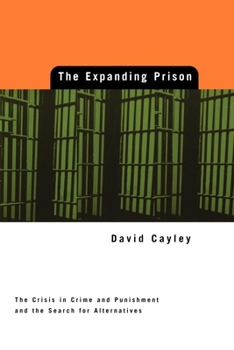The Expanding Prison
Select Format
Select Condition 
Book Overview
The Expanding Prison is a provocative, cogent argument for prison reform. David Cayley argues that our overpopulated prisons are more reflective of a society that is becoming increasingly polarized... This description may be from another edition of this product.
Format:Paperback
Language:English
ISBN:0887846033
ISBN13:9780887846038
Release Date:October 1998
Publisher:House of Anansi Press
Length:400 Pages
Weight:1.32 lbs.
Dimensions:1.2" x 6.2" x 8.9"
Customer Reviews
3 ratings
JUSTICE AS PEACE MAKING
Published by Thriftbooks.com User , 22 years ago
Cayley doubts that prisons are instruments of correction. Like all institutions they grow to a size which frustrates their original intention. To illustrate this he cites national (Canadian) and international examples of how prisons currently work. Cayley understands justice as peace making and incorporates into his arguments insights from critical thinkers whose notions are significant to prison reform. We are social beings prior to understanding ourselves as individuals, he notes, and suggests that a moral understanding of good and evil is necessary to obtain justice. He writes (p. 85) that "In a world without good, evil is secularized as crime." and "Justice without a sense of the good is darkened." Cayley offers excellent historical insights into the relationship between prison rehabilitation and Christianity that have implications for the future direction of the treatment of prisoners. The notion of 'truth as relational' (p. 323), which he attributes to Martin Buber, reveals a phenomenological understanding of justice. This understanding contrasts with the classical ideas of Aristotle and Aquinas which currently underpin concepts of justice. Anyone interested in the alternatives available for prison reform or the religious and pastoral care in prisons will find a wealth of information in Cayley's book.
JUSTICE AS PEACE MAKING
Published by Thriftbooks.com User , 22 years ago
Cayley doubts that prisons are instruments of correction. Like all institutions they grow to a size which frustrates their original intention. To illustrate this he cites national (Canadian) and international examples of how prisons currently work. Cayley understands justice as peace making and incorporates into his arguments insights from critical thinkers whose notions are significant to prison reform. We are social beings prior to understanding ourselves as individuals, he notes, and suggests that a moral understanding of good and evil is necessary to obtain justice. He writes (p. 85) that "In a world without good, evil is secularized as crime." and "Justice without a sense of the good is darkened." Cayley offers excellent historical insights into the relationship between prison rehabilitation and Christianity that have implications for the future direction of the treatment of prisoners. The notion of 'truth as relational' (p. 323), which he attributes to Martin Buber, reveals a phenomenological understanding of justice. This understanding contrasts with the classical ideas of Aristotle and Aquinas which currently underpin concepts of justice. Anyone interested in the alternatives available for prison reform or the religious and pastoral care in prisons will find a wealth of information in Cayley's book.
excellent argument for penal reduction
Published by Thriftbooks.com User , 24 years ago
Comprehensive book based on numerous interviews and extensive research. The author provides a very persuasive argument for penal reduction and explains how and why the rate of imprisonment in the West continues to grow steadily while crime rates are in fact decreasing. He also presents an good overview of alternatives to incarceration that have proven success (in direct contrast to the proven failure of imprisonment). I highly recommend this book.






